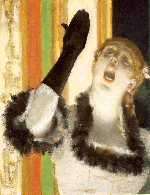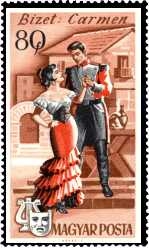|
Composers

Handel

Gluck

Donizetti

Weber

Rossini

Mendelssohn

Stravinsky

Verdi

Wagner

Debussy
|
 Aria
The aria is a song from an opera
Aria
The aria is a song from an opera  or an oratorio
or an oratorio ,
however composers wrote concert arias solely for performance in concert
halls, rather than in the frame of musical drama as the opera. In most
arias, the opening theme returns before the end - an
a-b-a form ,
however composers wrote concert arias solely for performance in concert
halls, rather than in the frame of musical drama as the opera. In most
arias, the opening theme returns before the end - an
a-b-a form . .
 In
contrast to recitative In
contrast to recitative ,
characterised by recitation contributing to the story line, the aria uses
in the opera as the pure form of musical expression, and an instrument
of articulating feelings. With Handel ,
characterised by recitation contributing to the story line, the aria uses
in the opera as the pure form of musical expression, and an instrument
of articulating feelings. With Handel ,
the area is vastly used, implementing the perception of human voice as
a musical instrument, what brought him and other aria composers to write
display arias, in which singers manifested their vocal ability and virtuosity ,
the area is vastly used, implementing the perception of human voice as
a musical instrument, what brought him and other aria composers to write
display arias, in which singers manifested their vocal ability and virtuosity .
Gluck .
Gluck ,
who opposed this phenomenon of making the aria a spectacle of the singer's
capability, and his successors Donizetti ,
who opposed this phenomenon of making the aria a spectacle of the singer's
capability, and his successors Donizetti ,
Weber ,
Weber and Rossini
and Rossini took the aria back to its origins - a dramatic
form, melodic yet technically restrained.
Verdi
took the aria back to its origins - a dramatic
form, melodic yet technically restrained.
Verdi ,
also among the greatest opera writers ,
also among the greatest opera writers   ,
wrote wondrous arias, and his funeral, a 200,000 people audience repaid
him by a spontaneous singing of one of his works.
Those who believed in drama underestimated
the aria's independent importance - Wagner ,
wrote wondrous arias, and his funeral, a 200,000 people audience repaid
him by a spontaneous singing of one of his works.
Those who believed in drama underestimated
the aria's independent importance - Wagner absorbed the aria in the general musical frame
(under the motto of "non-sop-music"), and Debussy
absorbed the aria in the general musical frame
(under the motto of "non-sop-music"), and Debussy attached it to a recitative, in a joint "singing-speaking"
style.
attached it to a recitative, in a joint "singing-speaking"
style.


|
Xtend
 Listen
Listen
 Period
Period
 Scheme
Scheme
 Dictionary
Dictionary
 Internet
Internet
 Projects
Projects
 Finders
Finders
|